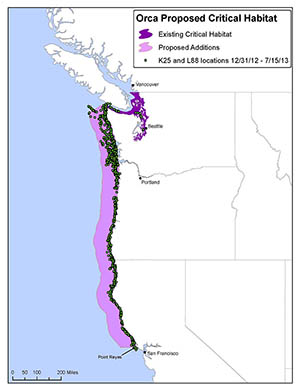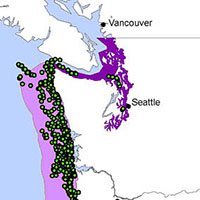— from The Center for Biological Diversity —
 The Center for Biological Diversity sued the Trump administration today for failing to protect the West Coast ocean habitat of the last remaining Southern Resident killer whales. The critically endangered species is down to just 75 orcas, the lowest number in more than 30 years.
The Center for Biological Diversity sued the Trump administration today for failing to protect the West Coast ocean habitat of the last remaining Southern Resident killer whales. The critically endangered species is down to just 75 orcas, the lowest number in more than 30 years.
The National Marine Fisheries Service failed to act on the Center’s 2014 petition calling for an expansion habitat protections off Washington, Oregon and California that could help Southern Resident killer whales, which are starving for lack of salmon and also being hurt by boat traffic and water pollution.
“Time is running out fast for these magnificent, intelligent orcas,” said Catherine Kilduff, an attorney with the Center. “It’s heartbreaking to watch them starving to death and mourning their dead calves. Every day that Trump’s people delay action is a step toward extinction for these whales.”
In 2015 the Fisheries Service decided expanded habitat protections were needed to safeguard key West Coast foraging and migration areas, but the Trump administration has failed to implement protections, despite broad public support for them.
While spending their summers in Puget Sound and the Salish Sea (areas protected as critical habitat in 2006), these killer whales travel extensively along the West Coast during the winter and early spring, congregating near coastal rivers to rest and feed on migrating salmon. The Center petitioned in 2014 to protect areas off the coasts of Washington, Oregon and California as critical habitat (see map).
The Endangered Species Act prohibits federal agencies from authorizing activities that will destroy or harm a listed species’ critical habitat. Animals with federally protected critical habitat are more than twice as likely to be recovering as species without it, a Center study found.
“Federal law requires protection of endangered species’ habitat. Our basic humanity should lead us to help prevent these beloved orcas from dying out right in front of our eyes,” Kilduff said. “So now we’re turning to the courts to compel the Trump administration to do the right thing.”
The Center for Biological Diversity is a national, nonprofit conservation organization with more than 1.6 million members and online activists dedicated to the protection of endangered species and wild places.
**If you are reading theOrcasonian for free, thank your fellow islanders. If you would like to support theOrcasonian CLICK HERE to set your modestly-priced, voluntary subscription. Otherwise, no worries; we’re happy to share with you.**








Thank you for reporting on this! The Southern Resident Killer Whales have intrinsic value. They deserve to live and thrive. They contribute to the beauty and mystery of this area we call home. We need for whale watching boats to leave them alone and for personal motors boats to not follow the whale watching boats and converge on them. We need to get off fossil fuels which are polluting the waters in which the SRKW’s live, and do all we can to stop pollution of all kinds, from plastics to detergents, from getting into the waters.
We also need to put more pressure on the Army Corps of Engineers to take down the four lower Snake River dams, which are making it much more difficult for the Chinook salmon to reach the Southern Resident Killer Whales. Chinook salmon make up 85% of the SRKW’s diet. And they have enough challenges without those dams.
It’s truly agonizing to watch this unfold. There needs to be an aggressive defensive and in some cases offensive campaign to tackle this issue comprehensively and simultaneously.
The Center is so right in bringing legal action as one of many avenues of defense but aside from this, financial support and pressing our politicians into action, what else can we do?
Suggestions?.